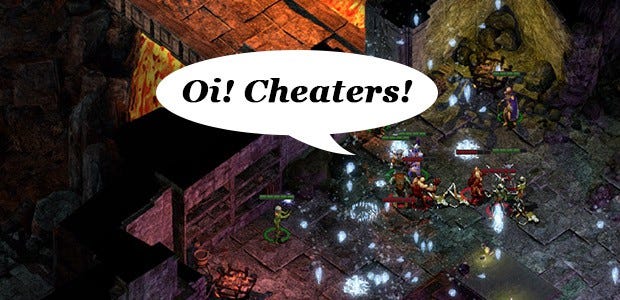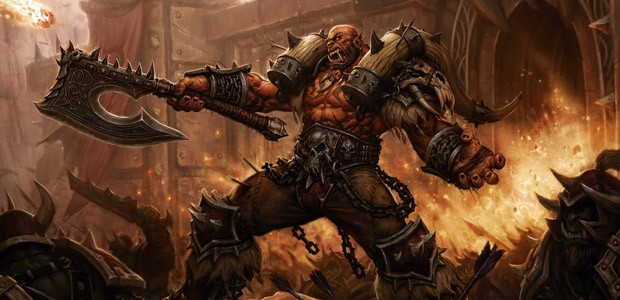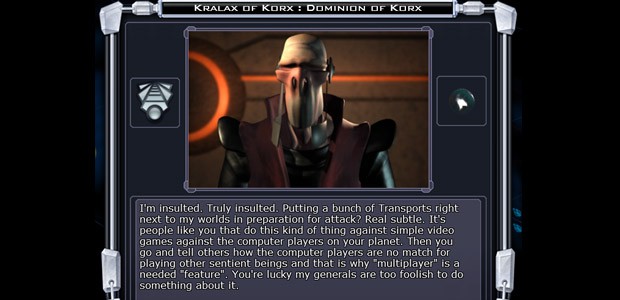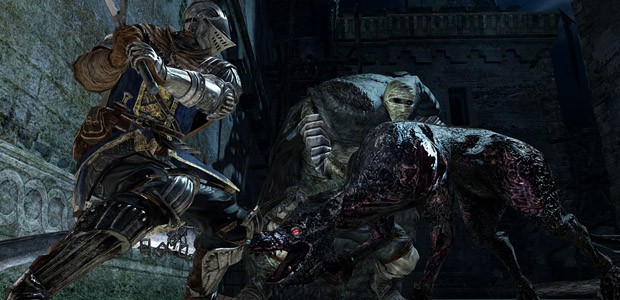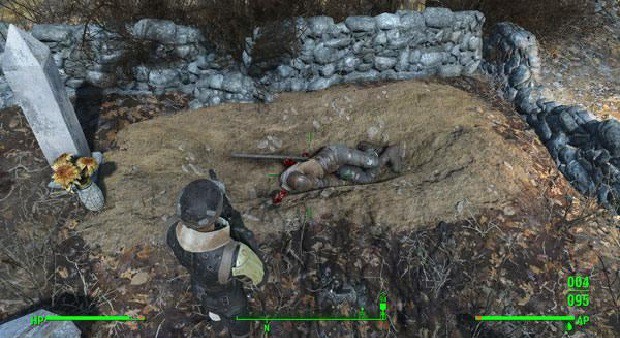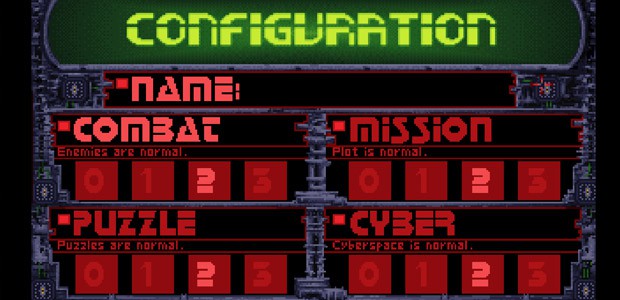The RPG Scrollbars: Story Mode
Cheat, drink and be merry
About eighteen years or so after marking Baldur's Gate off my To-Save list, I'm knee-deep in the Infinity Engine once again with Siege of Dragonspear. I'm not going to talk too much about it here, not least because there's a full review coming soon. But there's one thing I do want to talk about - not one new to the Enhanced Editions, admittedly, and that's its Story Mode option. Essentially, at any time you can flip a switch and even a Level 1 mage can suddenly wander into a Beholder's lair and poke every single one of its eyes out without the slightest danger. You can't die. At all. In every possible way, you render playing large chunks of the game pointless.
I entirely approve of Story Mode.
It brings up a lot of philosophical arguments that I've had many times, mostly related to MMOs. When I reviewed World of Warcraft: Mists of Pandaria for instance, I said that Blizzard should offer every player a free Level 85 character to play with. Fans hit the roof. How would anyone learn how to play, demanded the same people who usually insist that the levelling curve isn't actually playing and that you only learn to play at the endgame. Why would anyone not want to sit through the 84 levels of (mostly deserted at the time) content that haven't interested them in the past, including the achingly outdated Burning Crusade expansion, to play the game that finally made them want to jump in? What would that say to the players who paid their dues, to see a whole new generation of players simply having fun in exchange for time and money?
In essence: "I don't want other people to have it better than I did."
Well, as Descartes once so memorably put it, fuck that noise. I like games to be inclusive. I like the response to someone wanting to try something new to be "Absolutely." That doesn't mean accommodating every desire, no matter how silly - "Baldur's Gate needs car chases!" "Planescape Torment should have been a shooter!" - but it does mean accepting that games are now big enough that even fans of a particular series can come to it for many different reasons and in many different ways. Looking back, Baldur's Gate's big success was proving that D&D could be cool, but the parts that are generally remembered most fondly are the characters and the narrative side of their adventures rather than the minute-by-minute action. It wasn't a particularly great tactical experience, and much of the combat was deeply underwhelming. Even if it had been though, wanting to go back to hang out with Minsc and Boo some more, or see more of the Sword Coast, is every bit as valid a reason to be interested in a return trip as the new bigger scale battles that Dragonspear promises.
There's lots of reasons to love the genre, whether you like Mass Effect or still have the entire of The Magic Candle mapped out and mounted on a wall somewhere. The word 'fan' shouldn't be a badge that you have to earn, but a statement of enjoyment. And I think it's totally okay to accept that someone can be a fan and still not like a particular element.
Or for that matter actually be any good at playing RPGs.
It's a genre that's historically demanded much and taken few prisoners, whether it's the 50-100 hour playtimes that don't necessarily fit into peoples' lives any more (and often don't have the content to actually deserve that playing time) or the genre's habit of letting players get half-way through an epic quest before revealing that their character build is 60 points worth of mistakes or that the second half of the game has all the balance of a drunk one-legged lemur unicycling on chain-links over Niagara Falls during an earthquake.
It's also a genre that typically expects, if not outright demands, a solid grounding in systems and vocabulary that aren't necessarily intuitive - buffs and armour classes and skills intended to play into other skills and systems. Pillars of Eternity for instance expected all players to be immediately comfortable controlling a full party of unusual classes without any AI support, and the fact that the core playerbase probably had played Infinity Engine games before doesn't stop that being pretty bad/shortsighted design for 2015. At least it was patched after release.
If Story Mode is what it takes for players to get through a game that appeals, or even just a comforting option in a particular encounter, then so be it. I defy anyone, no matter how hardcore, to say that they've never used a cheat in a game, whether it's punching FUND into SimCity, tooling up in Doom with IDKFA, running a trainer, knowingly using an exploit, or outright hex-editing a save-file. Unless it's online, and thus affecting someone else's fun, it just doesn't matter.
Are you playing less of the game if you do it? Sure. But by being able to focus on the bits you like, you're also probably playing more of it. And next game? Maybe you'll take the training wheels off now that you have a little more experience or comfort with the basic world. Or even start again after a few hours with more of a sense of having 'gotten it'.
And, y'know, fair's fair! If you don't like the talkie bits, why not have the option to cut them down to the bare minimum too? "Shepard, I was wondering how you felt about blue ladies-" "NO TIME FOR LOVE! SHEPARD SMASH! SAVE GALAXY!" (Update: Reminded by comments that Mass Effect 3 had an Action Mode. Had completely forgotten that! Well, hurrah! Fair is fairer than hitherto thought!)
There's obviously a limit to how much games can bend over backwards for different tastes, though RPGs have a longer history of doing so than most - class choices, moral decisions, alternate paths, romances etc all in service of allowing the player power on a meta-level as well as in-game. The fact that the genre tends to be so systems-driven makes it easier to open up more possibilities than in other games.
Honestly, I'd like to see more options, where possible and appropriate. I'm not saying for instance that Dark Souls should have an Easy Mode, even though I'm probably the worst Dark Souls player on the entire planet. The whole nature of the game; its exploration, its learning by failure approach, its expectation that you work for your victories and so on mean that pulling a Story Mode would destroy the entire experience. It's asking for a completely different game that it has no interest in being, while removing most of the combat from Baldur's Gate is closer to just asking for your baconburger without cheese.
I would however love Blizzard to add a Solo Mode to World of Warcraft's endgame content, so that I can finish off storylines that previously ended in dungeons/raids. I want to fight the Lich King, who spent most of the expansion trying to make this personal. I want to bring down Hellscream in the Siege of Orgrimmar, like I've taken down so many threats to the Horde. I want to do the last 2% of my character's story - to see the big locations and meet the bosses and have a final epic fight... to feel part of the action instead of just watching the cutscenes later on. It's not that it's hard to find a group, it's that I don't enjoy WoW's dungeon or raid play, especially with random people who've already seen everything and have no interest in anything beyond what's in the box at the end of the fight. There's a reason few epic fantasies contain lines like "Thorin turned to Gandalf and said mage food plz'." or "And then Bilbo rage-quit."
Is this asking too much? I don't think so. I just want to finish the stories the way I've been playing them, with a character I have around ten years of attachment to. Keep the titles. Hell, don't open the Solo Mode version until the end of the expansion. I'll wait! At least there'd be no need to render a new cut-scene, since officially all the world's ills inevitably end up saved by some NPC running up and stealing the credit.
And I can think of quite a few other games where I'd have liked some more measure of control. Obviously, if you're making a game with spiders and you put a no-spider mode into it, then you've automatically earned 2% or a sentence about how awesome you are in any review. But that's a hyper-specialised example. While playing Fallout 4 for instance, I'd have loved to have been able to turn down a combat dial and turn up a survival one, to be able to personally tune the systems the way that I want them instead of hoping that the upcoming Survival Mod shares my priorities. In just about every game, I want to switch off hacking minigames. I'm sorry, but nobody's ever invented a good hacking mini-game, and I'd rather just be told 'nope' if I'm not going to break it.
Going the other way, one of the very few things I liked about the rebooted Thief was how you could tune the difficulty according to how realistic a thievery simulator you wanted, even if there wasn't a 'goodness' slider. And of course, we can't talk about custom difficulty without mentioning System Shock - a game so confident in its users that it basically lets you turn the entire game off. Even if it does lead to lots of hilarious moments where SHODAN goes "Welcome to my death machine!", only for a bunch of cyborgs to awkwardly appear and not be allowed to shoot anyone.
A little excessive? Perhaps. But I'd prefer controls like this to just one general easy/medium/hard option. Case in point, Deus Ex's Realistic mode, which technically counted as a 'hard' mode, but in a way that shaped the experience closer to what it wanted to be. Or, again, 2014's Thief reboot, which treated difficulty more as a mark of professionalism than anything else, by removing assorted meta assists. I can think of many, many games in which I'd have been happy for a fast-forward button, or simply a GTA V style "You're struggling. Want to move on?" option. But it doesn't just have to be about making games easier as a way of avoiding getting good at them, or adding more satisfaction to repeated and top-tier play.
We're not all good at the same things, and we can't be good at everything - as most designers who've ever had to think up a hacking mini-game will prove - while increasingly, the amount of time it takes to implement features in big games means that alternate routes and choices can be a big risk. If what starts as a minor itching irritation can soon explode into absolute fury - like Arkham Knight turning the Batmobile into Car-Car Binks over its running time, or a stealth-character in something like Alpha Protocol losing all hard-earned advantages thanks to an opening cut-scene where you get discovered - the risk is even greater. In this new era where nobody puts cheat-codes into their games any more, it's nice to know you have an escape hatch.
Should every game offer them? Nah. But in cases where designers know that players will be coming from such different vectors, as in most RPGs built on story instead of just dungeon crawling, it really wouldn't hurt to see a few more options. It'd be good to have options in game, after all, rather than simply forcing players to choose between sucking it up, seeing how the game ends on YouTube, or drifting away with the job undone.
Sometimes, it's okay for cheaters to prosper, especially when there's no reason for the rest of the world to either know or care.
